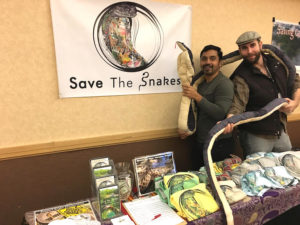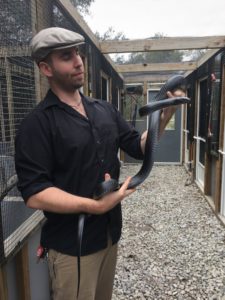Main Content

Career Profile
Job Title: Executive Director, Co-Founder
Name: Michael Starkey
Employer: Save The Snakes
What does a typical work day look like for you?
Save The Snakes does not have a physical office, so I have the great fortune to work from home. Not having a physical office space also allows me great flexibility to work when it is most convenient and even when I travel. Not paying rent for an office also saves much needed funds for our conservation efforts. No day is the same for Save The Snakes, as each day we are working on new and exciting snake conservation programs or activities. As we live in a digital age, it is not uncommon that I will communicate with people in several countries in a single day. Regardless of when I work, I always make sure to have balance in other areas of my life that are important to me, like spending time with family or in nature.
What is your favorite part about your job?
As Executive Director of Save The Snakes, I am able to use my knowledge of snake ecology, my positive attitude to inspire, and my enthusiasm for snake conservation to engage the public with protecting these beautiful animals. My favorite thing about my job is that I am able to combine that passion for snakes with my goals of making a positive impact on the world.
What is the most challenging part of your job?
Save The Snakes works to mitigate human-snake conflict and protect snake populations, but people really fear snakes! It is very difficult to solve snake conservation issues when snakes are so misunderstood or maligned by society. However, past and current education efforts have positively changed how our society feels about snakes, so I believe these difficulties can be overcome.
What childhood experiences sparked your interest in this career?
My childhood was filled with animals, because I loved them so much. My room was full of toys of plastic fauna: tigers, wolves, alligators and sharks, but never trucks or spaceships. My parents would often take me to the city zoo. Also, I was very fortunate to grow up with many pets. Dogs, cats, fish, rats and even chickens. As a young child, caring for animals helped me to develop emotionally and it greatly increased my empathy and compassion for others. As a child, I experienced some painful moments, as many kids unfortunately do. So, being around animals brought me great comfort during rough times. However, at some point, perhaps around seven or eight years old, I became fascinated, and admittedly obsessed, with reptiles. I would plead with my parents to let me keep a lizard and they reluctantly agreed. My mom bought me this very sickly, most likely wild-caught, juvenile iguana. The lizard died a week later. I was devastated, but I still loved reptiles, so my father would take me to monthly meetings at the local herpetological society. There I learned about reptiles from around the world! Then, a year or so later, I was allowed to get another lizard. Then one turned into two, then three, then four. Everything changed when at thirteen, I convinced my mother to allow me to get a snake, an animal she was not fond of. It was a Mexican black kingsnake and it was just awesome! That snake sparked a fascination that was truly unrivaled. Also, people hated snakes, so that made me love them even more.
How did your science education help you realize your dream career?The academic environment at my school was incredibly difficult for me, so I think science education taught in the classroom was lost on me. I definitely enjoyed science, but it wasn’t my favorite class. Of all courses, English and Art were typically my favorite. That is simply because these classes allowed me the freedom to express myself, whereas science is definitely more disciplined in what was being taught. However, science education did play a big role in my development., as I found ways to fuel my interest in animals outside of the classroom. As I kept a large collection of reptiles and amphibians, I would go to the library and check out books on herpetology. When the internet became well established, I would read as much as I could about reptiles. I would learn about their ecology, natural history and more. I would attend herpetological meetings and learn about reptiles from herpetologists, academics, and others. In high school, I purposely flunked my chemistry class, as it was not required for graduation. At the same time, I bonded with my chemistry professor over boa constrictors and wildlife research (he studied hornbills in Africa). After school, together with some other students, we created a research project to study the water quality of a nearby port. We collected samples and even presented our results to the mayor of the city. So, while school was difficult for me, I was still able to find learning opportunities in different ways. By navigating difficult academic situations, I was able to adapt my education to be somewhat nontraditional, but it worked for me. Thinking outside the box is so incredibly important to my work with Save The Snakes, as we are confronted with problems that require critical thinking and flexibility when solving problems.
What was your favorite science class?
Biology!
Which of the following activities can help youth develop the specific skills needed to succeed in your field?
Public speaking
Write stories/ Journal
Spend time outside in nature
Stay physically healthy
Take and edit photos
Learn about current events
Take care of a pet
Community service
Wildlife observation
Any additional advice for youth interested in your field?
Follow your passion, help others and treat people with respect, dream big and take little steps to get to your goals. For more advice, read an article I wrote, Careers in Wildlife Conservation.
